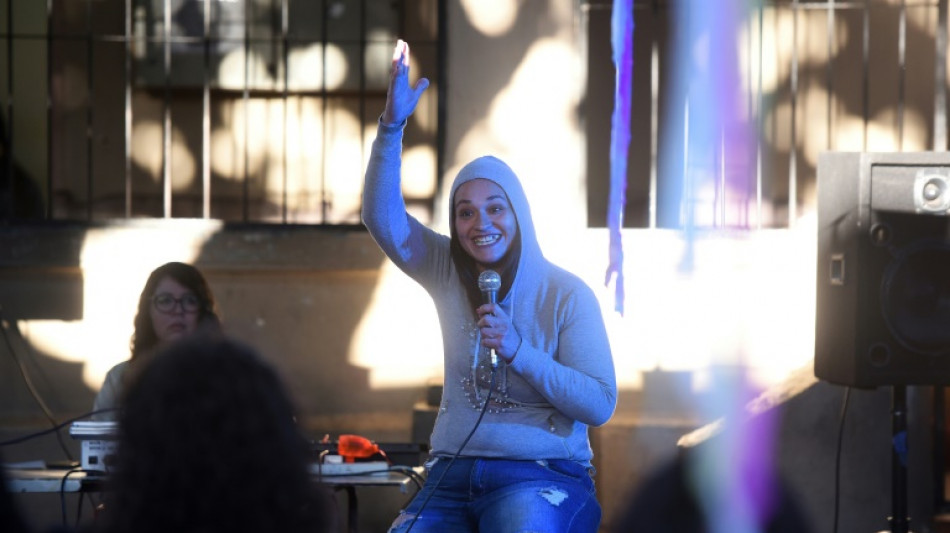
Comedy offers new routine for women prisoners in Paraguay

Adriana Torres is due for release soon from the biggest women's prison in the South American nation of Paraguay.
But she says she's in no hurry.
"I've no plans to escape," the gap-toothed 33-year-old mother of five joked as she took her bow after performing a stand-up comedy routine in the prison yard.
Torres is one of a dozen inmates at the Buen Pastor National Women's Penitentiary in Paraguay's capital Asuncion who took part in a two-month workshop run by the Corazon Libre (Free Heart) NGO which uses comedy to help convicts prepare for life on the outside again.
Like many of the women, hers is a grim story of drugs and deprivation.
Torres, who used to work at a gas station, hit rock bottom when she was caught stealing to feed her crack addiction and wound up behind bars for six months, leaving her father to care for her children, aged between one and 15.
"When my dad found out I was in prison, he came to see me and said: 'I'd rather see you here than on the street'," she told AFP as she left the stage to raucous cheers from her fellow inmates.
She said she started taking drugs five years ago, lived on the street for two years and was "really burnt out" by the time she wound up in prison.
Carolina Romero, the comedian and comedy teacher who ran the stand-up workshop, encouraged Torres to parse her past experiences, however painful, for their comedy potential.
"What fuels the success of stand-up is tragedy, but it requires skill and a certain amount of work to accept certain realities and be able to laugh at them," Romero told AFP.
- From tragedy to triumph -
In a grim prison environment marked by rampant overcrowding -- Buen Pastor has capacity for 200 inmates but a population of 550 -- the comic relief went down very well.
Some of the prisoners, who sat around the stage in red plastic chairs several rows deep, rocked back and forth with laughter during the performances.
In her monologue, Brisa Leguizamon Ferreira, a 25-year-old Argentine, talked about growing up in a big, close-knit family, the doting aunt of a clutch of boisterous nieces and nephews.
After they've been to visit "the house looks like it had been raided by the police," she joked.
"But when push comes to shove, we all rally round. That's what family is. We fight, but when there's a birthday, we all go. If someone gets sick, we're all there. If there's a wake, even more so: we all show up, minus one! Thank you!," she shouted euphorically after the mic drop moment of her routine.
Leguizamon and her husband were arrested in Asuncion in 2023 on charges of drug dealing across the border in the Argentine city of Rosario.
Argentina is seeking the extradition of the couple.
The prisoner, who wore pink-tinted glasses and a sleeveless puffer jacket, was reluctant to discuss her case, preferring instead to focus on her five minutes of stage fame.
"I was nervous, but they (Romero and her team) helped me a lot," she told AFP. "I do believe that this can be a good tool for the outside world, now we have to see if we succeed."
- 'Liberating exercise' -
Romero is convinced that if the women can come up with the right punchlines and a compelling story of personal redemption, their backgrounds could make them ideal candidates for a career in comedy.
"While they may not hire you with a background like this in other professions, in stand-up it's very likely that they will want to take you on," she said.
Overcrowding is a chronic problem in Paraguay's 18 prisons, which were built to house 11,000 people and are now creaking at the seams, with over 18,000 prisoners.
Buen Pastor's director Yenny Delgado told AFP the stand-up workshop aimed to help make life more bearable for those inmates invited to take part due to good behavior.
For those chosen few, "humor is a liberating exercise," Romero said.
(G.Khurtin--DTZ)
